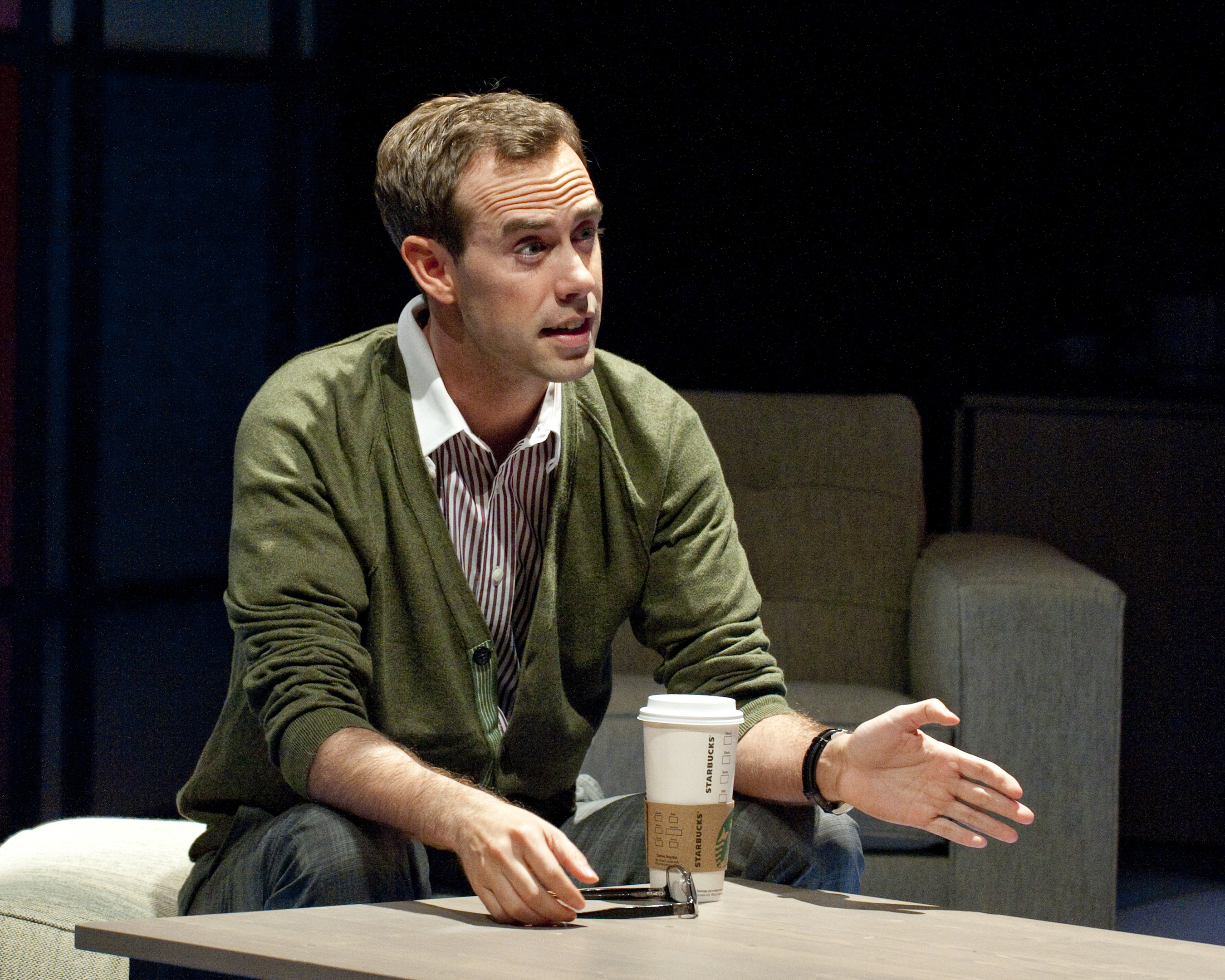Yesterday the Dallas Theater Center announced that Lee Trull, currently the theater’s literary associate who is also a member of the Brierley Resident Acting Company, will step up to a senior position on the artistic staff. Trull’s title is Director of New Play Development, a newly created position that formalizes the theater’s commitment to supporting new work—a standard mission of larger regional theaters and one that has flourished under artistic director Kevin Moriarty. We sat down with Trull, who has been with the DTC since 2008, for a quick conversation about the move. He’ll start officially on April 29.
FrontRow: What does [the position] mean?
Lee Trull: It means basically that I am in charge of script submissions, producing new play workshops, readings, and full productions of plays and musicals. It includes a lot of the sort of artistic leadership and education work I’ve been doing but I’ll have more time to focus on that. So that means I’ll be teaching a bit, that means I’ll be involved in season selection. Occasionally I’ll be involved in directing assignments. The most present version of that, the one that’s happening the soonest, is that in this 2013 [season], our new move—Christmas Carol in to the Wyly, which Kevin will be directing—I will serve as associate director, and take the show over when we do it again in 2014. So that’s exciting.
FR: And this is your first time directing on a LORT [League of Resident Theatres] level?
LT: Yeah. Yeah, I was the assistant director for Superman…when we did It’s a Bird…It’s a Plane…It’s Superman years ago, for Kevin. And of course as casting director at the theater I’ve been involved a lot of that type stuff.
FR: How long has the creation of this job been in the works?
LT: Kevin’s always got secret plans in his head and we never know what they are. But Kevin and I have talked often about the tension in being an actor on stage, as a main part of my job, and the other, artistic endeavors I want to explore. And about the need within the theater to have somebody full time monitoring literary management, helping develop new plays, someone else on staff as a leader whose job is solely to focus on new play development. So who knows. Couple years, maybe. They moved me to literary associate this past year. So I was acting on stage, and I was doing this literary associate job, and my job was—Kevin Moriarty, who is the artistic director—that may have been a little bit of a flirt, a little bit of dating for this job. But I was surprised when the offer came so soon, and that it was…that he had so much faith in me to jump right in.
FR: And you start…
LT: Soon. Couple weeks. Now. I mean, I’ll finish up my acting assignments, including what we call our Skokos Learning Lab. The Skokos Learning Lab is the advance acting class at Booker T. I teach a six week unit there every year, and their final assingment, it’s a group of senior acting-focused students at Booker T. who learn from Kevin, from Christie Vela, from me, from other acting company members, Joel Ferrell, throughout the year. And their final assignment is scenes that they perform with acting company members. So my last official job as an acting company member will be to perform in a scene with high school students, which I’m very excited about. And I’ll be able to, at that point as soon as that’s done, focus solely on this new job. Which will be around April 29.
FR: Do other theater companies similar to the DTC have this kind of job or focus on new play development?
LT: Yes. Honestly, there’s a lot of theaters that have new play development or lit manager or a combination of the two. A lot of them have literary staffs, which I will not have. But it is a key part of it, if you decide you want to do new plays and new musicals, you need a full-time staff member who pays attention to that.
FR: And why does the Dallas Theater Center want to do that?
LT: Well, I think it’s been part of our mission for at least the last five years. We’ve done a new play every year, often a new musical, but new plays as well. We have several writers under commission. It’s a focus of what we do. It’s a big part of our year, bringing something that Dallas hasn’t seen and that the world hasn’t seen yet. We’ve been doing it.
FR: And you personally?
LT: I think it’s very, very important, that for the American theater to be sustainable that we start providing resources to writers. A place where they can develop their work, a place where they can have their work produced. I think at the very least, if we’re not going to produce them, or if we’re not going to commission them, if we’re not going to develop their work, that we should, and by this I mean every major theater, should be aware of the writers that are out there, what they’re doing, who they are. So that we can exchange that information with each other and reach out to them. ‘This writer is not perfect for our theater, but they are really great for your theater.’ ‘San Francisco audiences are going to love this guy, do you know anybody that Dallas audiences, and particularly our audience, might be engaged with?’ I think that theater is a tricky thing. Right now on Broadway a lot of the shows I really like are shows that were movies, or shows that are retreads or attached to Disney. And those are all shows that I really really enjoy. But I think that to keep developing this art form, to keep America at the forefront of it, I think we’re going to need to have writers. And I think that writers are gonna have to have support. It’s the job of a bigger theater to provide that support.
FR: Are you looking at anyone locally?
LT: I’m very aware of local writers in town, very excited by the work that’s happening. And not just by the writers, but also by the festivals and theaters that pay attention to that. I think the New Works Festival at Kitchen Dog Theater is a very important resource. I spent time at the TeCo Theater and watched their local playwriting festival and had a great time. I of course know Vicki Cheatwood very well, I know Steve Walters very well; I’m well aware of what Matthew Posey’s up to, I’m very aware of what Jonathan Norton’s doing, as well as many many other writers around town. I’m thrilled for the chance to be able to go out and see plays by local playwrights, and read their work.
FR: When do you think we’ll start seeing the impact of what you’re doing?
LT: Well, I think I’m jumping on to an already moving train. We have Fortress of Solitude happening next year. We’re deep into the development of a musical called Stagger Lee. We are currently producing a new musical called Fly By Night followed by a huge new musical called Fly. So I think I’ll be jumping on the train and trying to help steer this vessel that I’m handed. New work is already happening.
FR: Anything else?
LT: One thing that I haven’t talked about, besides having a boss who is very focused on new work, I have a partner in crime. And he’s the playwright-in-residence at our theater: Will Power. Will is very focused on what’s happening in the community, he’s very aware of local writers. He’s very aware of what’s happening nationally. He’s excited and enthused, always has a new idea. It’s going to be a good job keeping up with him.






